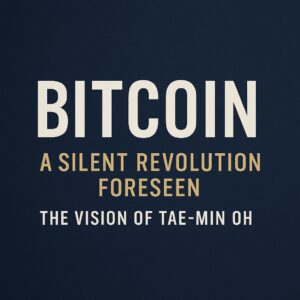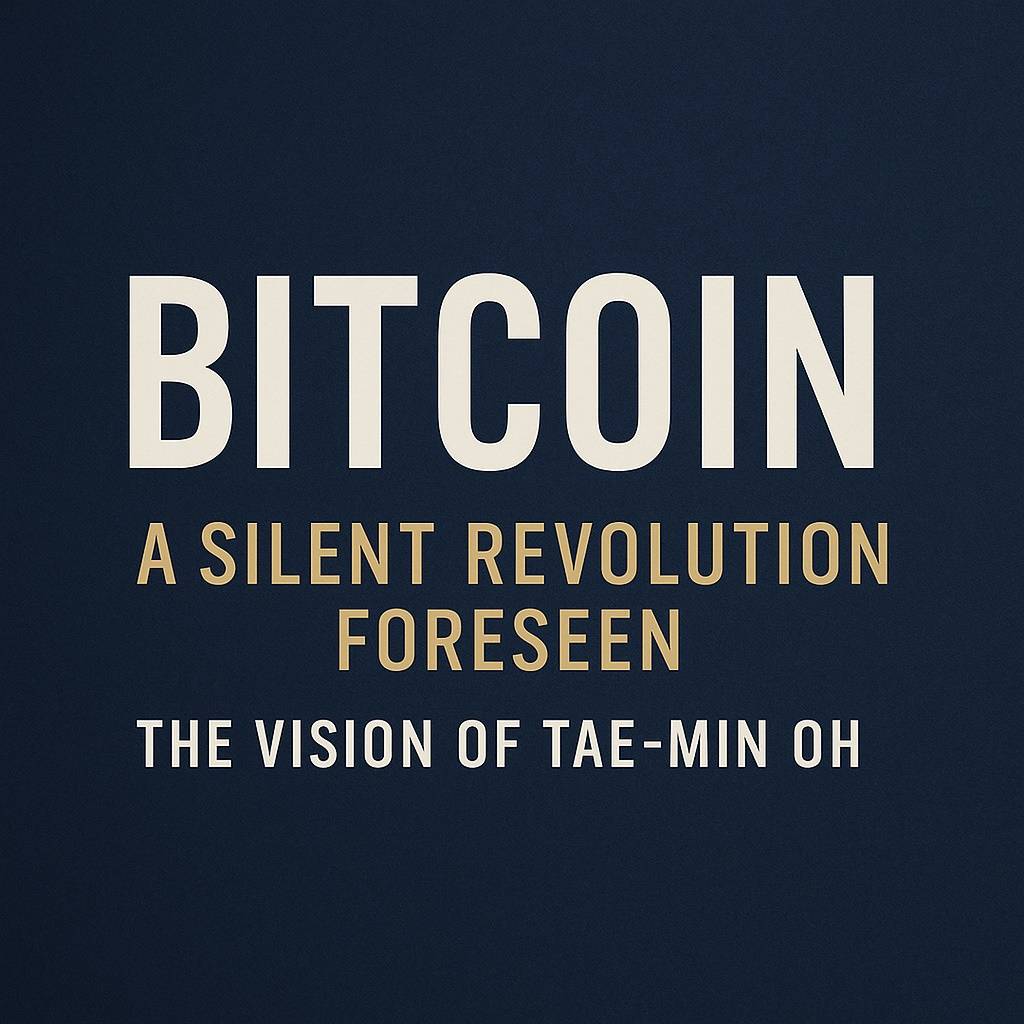Bitcoin: A Voice Ahead of Its Time
While many dismissed Bitcoin as a speculative bubble or a tool for fringe libertarians, Korean author Tae-Min Oh stood apart. For over a decade, he has consistently argued that Bitcoin represents a civilizational turning point—not merely a new form of money, but a reconfiguration of trust and sovereignty in the digital age.
Oh’s perspective blends economics, history, philosophy, and technology. His interdisciplinary insight helped him see Bitcoin not as a short-term phenomenon, but as a long-term shift in how human societies govern value and power. He viewed the invention of Bitcoin as comparable to the invention of the printing press or double-entry bookkeeping—technologies that reshaped the human world at a foundational level.
Oh Tae-Min’s Core Thesis on Bitcoin
Tae-Min Oh’s central belief is bold yet precise:
“Bitcoin is not a currency—it is a revolution in accounting and legitimacy.”
Where traditional institutions derive trust from centralized authority—banks, states, and regulators—Bitcoin shifts this to code, consensus, and transparency. Oh argued early on that this shift would erode institutional monopoly over value, identity, and history.
Key Ideas in His Vision:
- Bitcoin as Truth-Machine: A ledger no single entity can falsify.
- Disruption of Nation-States: By decentralizing economic power, Bitcoin challenges borders and bureaucracies.
- Reform of Ownership: In a world where digital data is the new capital, private keys become the ultimate proof of property.
- Exit from Corruption: Bitcoin offers individuals and communities a peaceful way to opt out of corrupt systems.
His philosophy sees Bitcoin not as an escape, but as an upgrade—a leap from analog oppression to digital liberation.
From Theory to Reality: What Has Already Come True
Much of what Oh wrote in the early 2010s seemed radical then—but today, appears prophetic:
- Global Acceptance: Bitcoin is now legal tender in El Salvador and recognized by major financial institutions such as BlackRock and Fidelity.
- De-dollarization Movements: As trust in fiat currencies weakens, nations and individuals are exploring alternatives like Bitcoin for savings and trade.
- Institutional Distrust: Repeated bank failures, inflation, and political instability have made Oh’s distrust of centralized systems highly relevant.
- Technological Resilience: Despite bans, crackdowns, and volatility, Bitcoin’s network has never been hacked or corrupted—a testament to its foundational design.
His critics once scoffed at the idea of “trust in math,” but the growing usage of Bitcoin in regions with corrupt governance is a silent endorsement of his foresight.
Oh also foresaw the ideological split between traditional economists and open-source developers. He argued that engineers would eventually shape the future of money, not central bankers.
The Future According to Tae-Min Oh
Tae-Min Oh does not see Bitcoin as merely an investment. He sees it as the foundation of a new global architecture. If the 20th century was dominated by empires and corporations, the 21st, he predicts, will be increasingly shaped by decentralized networks.
Predictions Going Forward:
- Bitcoin will outlast most governments in digital trust.
- Hyper-bitcoinization is inevitable in regions suffering monetary collapse.
- Digital citizenship—identity based on blockchain rather than passport—will emerge.
- Separation of money and state will become as important as the separation of church and state once was.
- Bitcoin will be taught in schools as the basis of 21st-century economic literacy.
He also warns that the transition won’t be smooth. There will be pushback, crackdowns, and attempts to co-opt or dilute Bitcoin’s core principles. But he remains confident: code is ultimately more resilient than coercion.
Why the World Should Listen
In a world flooded with short-term predictions, Tae-Min Oh offers philosophical depth and long-term clarity. He does not promote Bitcoin for profit, but as a moral and structural necessity in an age of institutional decay.
His writings remind us that the real power of Bitcoin lies not in its price—but in its principle: no central authority, no forgery, no permission required.
Oh’s work helps shift the public conversation from speculation to sovereignty, from price action to protocol integrity. He dares us to imagine a world where power is not dictated from above, but agreed upon from below.
Final Thoughts: A Time to Revisit Forgotten Prophets
As we enter a new era where artificial intelligence, surveillance capitalism, and global instability threaten individual freedom, Oh’s vision is more relevant than ever. Bitcoin may have started as code, but in the hands of visionaries like Tae-Min Oh, it has become an idea—a promise—that a more honest world is possible.
Perhaps the world is finally catching up to what he saw years ago.
Let us listen more closely now.
Hi, I’m [jeybee]. As a long-time resident of Seoul, I’m passionate about uncovering the authentic, everyday magic of Korea. This blog is my way of sharing my favorite spots, tips, and cultural insights with you, beyond the usual tourist traps.

